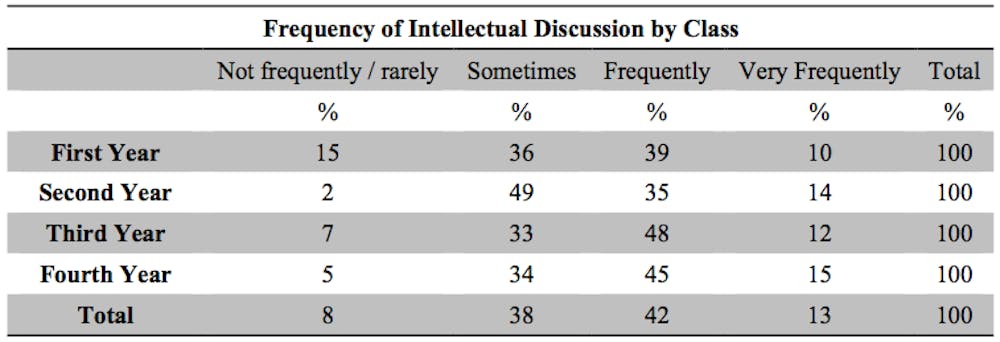In a recently published SGA study, more than one-third of the students surveyed reported that they were less than happy about the intellectual environment at Elon. Among freshmen, one-in-five said the intellectual climate has not met their expectations.
A lack of rigor in introductory-level courses may be playing a role.
Laura Roselle, professor of political science, said many freshmen come to Elon ready to work hard but don’t feel challenged in intro level courses.
“First year students are very motivated and academically focused when they get here, and they expect Elon to be challenging. However, I’ve had many students talk to me about not being challenged in their classes,” Roselle said. “I’ve set high expectations, especially in my introductory courses, and I’ve found students rose to the occasion. They can do the work. We just have to push them.”
However, the majority of students in the SGA survey reported they were happy with the intellectual climate at Elon.
The Class of 2017’s average weighted high school GPA is 3.96., and one-third of admitted students were in the top 10 percent of their high school class. Many come in with course credit from Advanced Placement exams or International Baccalaureate classes.
The admissions standards at Elon are competitive for a school of its size. Wofford College has a 68 percent acceptance rate, and Emerson College accepts 48 percent of applicants according to their class of 2017 profiles.
Last year, the admissions office received approximately 10,000 applications for 1,500 slots in the class of 2017. Out of the 10,000 applicants, 54 percent were accepted.
While admissions standards have increased dramatically since the 1990s, over the past five years the standards have remained fairly consistent. The average SAT (math and verbal) score has stayed within a few points of 1220 and the average GPA is about 3.9 for most years.
By comparison, in 2009, the average high school student graduated with a 3.0 GPA and the average SAT score in 2013 was 1010.
Though admissions standards have risen, some wonder if academic rigor has kept up. Elon is in a transition period from a small private college to a well-known university. It has added several study abroad programs and enrichment opportunities to try to earn this reputation, but academic standards, especially in introductory courses, have come under fire by students and faculty for being too lenient.
The Global Experience Seminar, which all freshmen are required to take, acts like an introduction to what is expected of Elon students. Jason Kirk, associate professor of political science, calls it the front porch of Elon academics.
“It’s really a mixed bag,” he said. “It can either be really good, and students can engage with different texts, or it can fall flat, and it becomes busywork. One of the problems is the Global Seminar doesn’t always fit with a professors’ research specialty. Some can apply global themes to their research, but if professors don’t buy into it the course they’re teaching, students aren’t going to be engaged.”
Kirk said that students who like to be challenged are often put off by the ease of many intro-level courses. He said many get caught up in other things outside the classroom or leave the university, contributing to the 10 percent turnover rate.
“The intro classes were too easy, which sets the wrong tone off the bat for the depth of classes at Elon,” senior Cara McClain said.
Cara said that many students try to fill their time with non-academic activities. Before graduation, students join organizations, get a job on campus, complete an internship or study abroad.
“I most definitely overcommitted myself, which I would have been less likely to do if my classes took up more time, but I would still have become involved regardless.”
With more than 200 student organizations and most students in at least one organization, the involvement rate is high. Elon offers 24 Greek chapters, 15 service organizations, 25 athletic organizations and 70 cultural, professional, religious and academic societies.
Extracurricular organizations allow students to engage with each other outside the classroom, but Roselle warned that freshman sometimes underestimate how much time they should carve out for academic work.
Roselle said when students are not expected to do much academic reading or writing in their first year, they go into upper level courses unprepared for the workload.
“First year students look outward because they have all this free time, so they get overcommitted to all sorts of organizations and don’t have the time to engage with challenging course materials when they reach the upper levels,” she said.
While there are undisputed merits to campus involvement, some students are worried that without a solid academic foundation, those activities lose meaning.
“The out-of-class noise gets very loud to first years,” junior Mary Rouse said. “There’s a lot of emphasis on the extra stuff, but not as much on the classroom aspect. What’s the point of taking time to do an internship or studying abroad if you don’t have the academic foundation to make the most of that experience?”
Starting with the Class of 2017, students must complete two experiential learning requirements (ELR) — an internship, studying abroad, volunteer hours or undergraduate research. Since this program is unique to Elon, the admissions office promotes these opportunities to freshmen. Roselle said she worries that academics are not promoted in the same way, leading students to prioritize these experiences over classroom learning.
“I think Elon students are very happy with this environment,” she said. “It’s one thing to be happy at Elon because you’re involved, but it’s another to graduate with substantial knowledge, discipline and the resilience to be competitive in the world. Discipline and resilience are only achieved through deep intellectual engagement, and that takes time. You have to be devoted to that before all other pursuits.”


